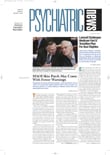After a month on a heavy night-call schedule, resident physicians perform neurobehavioral tests as poorly as they do after consuming three to four alcoholic drinks when better rested, researchers at Brown University Medical School have found.
Thirty-four pediatric residents, 18 women and 16 men in their late 20s, participated in the prospective study, reported in the September 7 JAMA.
J. Todd Arnedt, Ph.D., now a clinical assistant professor of psychiatry at the University of Michigan School of Medicine, and colleagues at Brown University assessed the residents' attention, vigilance, and driving skills at the end of two four-week rotations under four conditions: light call, light call with alcohol use, heavy call, and heavy call with placebo.
The study was conducted between October 2001 and August 2003. On the light-call schedule, residents averaged 44 hours of work a week in daytime clinics with night call only if the on-call resident became ill. On the heavy-call schedule, they averaged 90 hours a week (80 hours after nationwide resident work hour limits went into effect July 1, 2003) in neonatal intensive care, pediatric intensive care, or wards, with mandated call every fourth or fifth night.
The week before the testing, residents on the heavy-call rotation averaged five hours and 20 minutes of sleep a night, and residents on the light-call rotation, six hours and 38 minutes a night, or 78 minutes more.
Residents on the heavy-call rotation spent the night before the testing on call, averaging just over three hours' sleep. Residents on the light-call rotation slept their usual amount.
After arriving for test sessions at 3 p.m., residents completed self-report sleepiness assessments. They then took a 60-minute standard battery of attention and performance tests, plus a driving-simulation test, and assessed their own performance and effort.
Next, they consumed either alcohol (light call) or a nonalcoholic placebo (heavy call) and repeated all tests and self-evaluations.
The alcohol consisted of vodka mixed with tonic, adjusted to body weight, to produce equivalent peak blood alcohol concentrations (BAC) of 0.04-0.05 g% per 100 mL of blood. The placebo consisted of an equal volume of chilled tonic water, dispensed from vodka and tonic bottles. In both heavy-call and alcohol conditions, residents received rides home after taking tests.
After consuming alcohol following light call, and before and after consuming placebo following heavy call, residents' reaction times were 7 percent to 10 percent slower and their error rates 40 percent higher than they were after light call alone. “Decrements of that magnitude are potentially significant in the patient-care setting,” Arnedt said.
In both heavy-call conditions and after light call with alcohol, residents failed to maintain consistent speed and lane position and drove off the road more frequently on the driving test than they did after light call alone. They showed only limited ability to judge the extent of their own sleepiness and impairment, however.
This is the first study to compare impairment related to heavy night call directly with that resulting from alcohol ingestion, Arnedt said. The observed post-call deficits, he said, reflect both acute sleep loss and superimposed chronic partial sleep deprivation common in residency training.
In another report in the same issue of JAMA, Kathlyn Fletcher, M.D., of the Clement J. Zablocki Veterans Affairs Medical Center in Milwaukee, Wis., and colleagues reviewed 54 studies assessing effects of interventions to reduce work hours on residents' education and quality of life.
Psychiatry residents surveyed in one study reported that use of a night float benefited their well-being, education, and clinical duties. Residents in various disciplines felt reduced hours generally aided quality of life, but did not always improve their patient care or educational experience.
“Despite the intuitive appeal of restricting working hours, it is important to consider potential negative ramifications,” said sleep and chronobiology specialists Drew Dawson, Ph.D., of the University of South Australia in Adelaide, South Australia, and Phyllis Zee, M.D., Ph.D., of Northwestern University in Chicago, in an editorial in the same issue of JAMA.
Reducing work hours may increase patient risks in some situations. Taking a broad systems-based approach to safety management, which might include altering standard procedures, they said, also might help defend against fatigue-related errors.
JAMA 2005 294 1025
JAMA 2005 294 1088
JAMA 2005 294 1104
